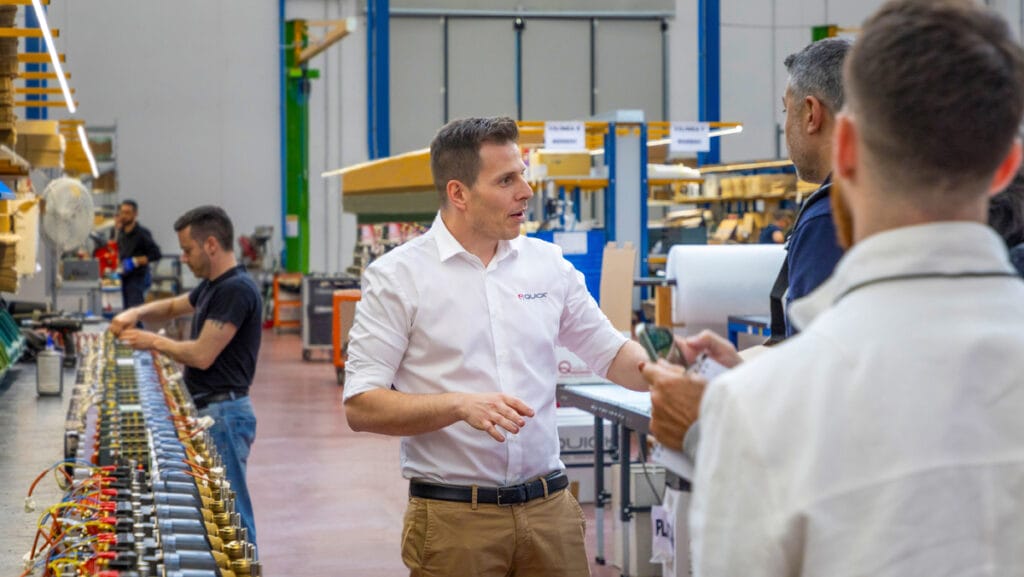
Simplicity and detail are keys to Quick Group’s sustainable successes

Quick Group recently presented its sustainability program and its targets for 2025. MIN sits down with Marco Rodi, chief operating & sustainability officer, to understand his drivers for change.
According to Rodi, sustainability is part of the company’s DNA. “It is nothing new for us,” he says.
“Now everyone talks about sustainability and there are specific regulations and processes and approaches. But this is good for us as it gives us common guidelines with competitors.”
Since he’s been with the company – around a year – the company’s achieved measurable successes. Rodi speaks with genuine excitement of what he terms the ‘simple’ solutions that the company has in place to make sure its in-house practices have a decreasing footprint.
He defines the approach that Quick Group’s implemented as ‘detail’.
“Simple things are important. We are focused on every single detail. The real situation is that a lot of small details give an amazing result,” he says about the continuous improvement approach that’s been adopted.
“We are continually finding problems. And then understanding how to solve them. For us, that’s our process – to consider every day is not good, and is not perfect. We have to understand how we can do better than we did yesterday.”
The company unveiled its EDG roadmap in July this year.
In manufacturing, he says: “Your focus is to identify waste and losses and find specific solutions through a new process. If we are able to reduce waste and losses, we increase value.”
Rodi fires off numbers about reduced energy consumption. In 2023, consumption in Quick Group was reduced 12.5 per cent compared to 2022. In 2024, the reduction was 6 per cent compared to 2023.
“We measured and analysed how we use energy, and where we are losing it,” he explains, noting – again – that small details have big impact.
He talks animatedly about changing lightbulbs and roof materials. “Now we have much more natural light in the factory and it’s possible to reduce the energy consumption we need.”
Then there’s the product and packaging.
“We’re trying to use recycled material. Sometimes it has a different mechanical characteristics, but the aim is to use recycled material.
“All packaging comes from 100 per cent recycled paper as that doesn’t need specific mechanical characteristics – it needs to protect the product only.”
“If you’re able to improve every single day, you’ve got 365 days of improvement.”
Quick Group uses local supply chain to help with sustainability
Rodi outlines that geography is also a key driver to a smaller footprint. The group has a closed supply chain which helps with its sustainability.
“We prefer to use local suppliers close to our facilities. We’re not interested in finished products from overseas. Sometimes we have to buy from global sources, but if it’s possible we want to produce products internally or sourced from close to us.”
“It is not a cost matter. We chose ‘quality + distance’ over cost. We could spend a bit less on suppliers, but it’s then adding transport etc. The total value is the key driver for us.”
With that in mind, the group is pushing all its business partners to achieve high standards of sustainability along the entire supply chain. It’s promoting more responsible business processes, encouraging several suppliers to adopt sustainable practices and certification in their own supply chains. Partners are required to also lead change.
Part of this work will be to design the supply chain at the group level. “Sometimes we have different suppliers and we have to understand how we can manage those in a proper way. Our focus is to align all suppliers together with our vision and approach. The majority want to follow our approach.
“As we evolve, suppliers will have to do the same. If they can’t do that, they can’t be in our supply chain in the future.”
“But there’s no reason to change our suppliers at the moment. All of us, plus all of them, would like to grow together.”
 Marco Rodi. Image courtesy of Studio Borlenghi.
Marco Rodi. Image courtesy of Studio Borlenghi.Plus Rodi’s very conscious that with the group’s recent acquisitions, there is work to be done on aligning practices across the brands.
Aligning sustainability across the entire Quick Group
“Our first thing is to think as a group, then work and grow as a group. Each company has a specific DNA and history. But we can’t think about the future by using a mirror to look back. We have to be equally following the same standards and align the identities and philosophies of all the brands. We have to work in a common way and spread the same level of vision to all levels of each company.”
The complete adoption of the group’s quality system and inclusion and sustainability practices are expected by all brands and locations in 2025. Quick Group also aims to transition to electricity that is 100 per cent generated from renewable sources with GO (Guarantee of Origin) certificates. It’s proceeding with ongoing development of its production companies and the entire supply chain, working to obtain certifications in the future in line with ISO 14064 for production companies and ISO 14067 for certain product categories. The aim is to align with international standards and ensure environmental sustainability at all stages in the production process.
“A solid quality system not only guarantees compliance with standards but lays the foundations on which to build dependability and gain customers’ trust,” says Rodi. “The strict requirements of ISO certifications ensure that every business process is optimised, compliant and constantly evolving, creating lasting value and reducing risks. Investing in quality means investing in the future. After renewing the ISO 9001 certification obtained during the year, our goal for 2024 was to obtain ISO 14001 and 45001 certifications for Quick Spa. The goal for 2025 is to extend ISO 9001 certification to all group companies and start them along the same path as the parent company, so that complete homogenisation is achieved, and the various companies will be aligned by the end of 2026.”
The post Simplicity and detail are keys to Quick Group’s sustainable successes appeared first on Marine Industry News.


